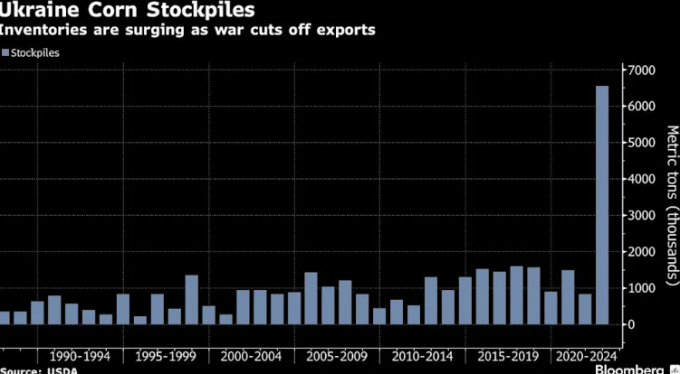June 21, 2025 | 02:33 GMT +7
June 21, 2025 | 02:33 GMT +7
Hotline: 0913.378.918
June 21, 2025 | 02:33 GMT +7
Hotline: 0913.378.918

Source: USDA/Bloomberg
Ukraine’s corn exports will drop by another 4.5 million tons to 23 million tons and wheat exports by 1 million tons, according to the U.S. Department of Agriculture’s closely watched World Agricultural Supply and Demand Estimates, or WASDE. Global wheat stockpiles were revised down to 278.4 million tons, less than expected by a Bloomberg survey.
Russia’s war in Ukraine is upending trade flows out of the critical Black Sea breadbasket region, prompting warnings of food shortages as crucial supplies of wheat, corn and cooking oils are at risk. Food prices are surging at the fastest clip ever and worsening world hunger, putting pressure on other big growing areas to produce big crops this year.
“There’s an increased possibility of the conflict getting out of hand again. Peace is not coming any time soon,” said Jack Scoville, analyst at Price Futures Group Inc. in Chicago.
Grain and oilseed futures have jumped to record or near record highs, and also caused a spike in prices of farm necessities like fertilizer and fuel. Meanwhile, weather woes and inflation in key producers like the U.S. and Brazil are clouding the outlook for this year’s crop supplies.
While USDA raised its forecast for Brazil’s current corn crop more than expected, the real test will unfold over the next several weeks. April is a critical growing period for the grain and if adequate rains don’t arrive in time it could crimp yields.
Most-active corn futures in Chicago briefly plunged after the U.S. report hit but quickly bounced back to settle 1.4% higher at $7.6075 a bushel. Benchmark wheat rose 3.2% to $10.5825 a bushel and soybeans jumped 2.6% to reach $16.89.
Ukrainian Crops Pile Up as War Closes Ports: WASDE Takeaways
Prices had been up prior to the report’s release amid news that Russia bombed a major rail evacuation hub in Ukraine, killing dozens of people.
Sidelined Supplies
To see how significantly the war is upending crop flows from Ukraine, its corn stockpiles tell the story. The war has left the country saddled with huge amounts of grain that it’s largely unable to move. With its ports shut, Ukraine is working to ramp up exports via rail, but the flows remain well below normal seaborne trade.
The chaos in the Black Sea so far hasn’t led to a jump in U.S. grain exports, though there were signs of fresh corn demand this week when China scooped up 1.1 million tons, the Asian nation’s biggest such buy in almost a year.
Besides the worsening war that’s affecting Black Sea exports, the report was bearish, according to Naomi Blohm, senior market adviser at Total Farm Marketing in Wisconsin, with no changes to U.S. corn reserves, bigger wheat supplies and a smaller-than-expected cut in U.S. soybeans stockpiles.
Soy Switch
Shifts in the soybean markets are also underway. The report raised U.S. exports while lowering shipments out of Brazil, as well as Ukraine and Russia.
South American soybean crops are down a combined 33 million tons below initial estimates from November, which marks a record loss for the region after a strong drought caused by La Nina weather patterns. With that cut in production, the smaller South American exports will drive more demand to the U.S. for summer and early fall.
Bigger U.S. exports will likely to shrink end-season U.S. soybean stockpiles by 8.8%, the largest decline in the month of April since 2012. It’s an unusual move because supplies in America are typically well known at this time of year.
U.S. curbs Russian access to foreign fertilizers and valves
The Commerce Department said it will begin requiring Russians and Belarusians to get a special license when seeking to obtain a host of goods from U.S. suppliers and pledged to deny those licenses. The goods include fertilizer, pipe valves, ball bearings and other parts, materials and chemicals.
The administration said items made abroad with U.S. tools would also require a U.S. license, which the administration plans to deny.
"It is evidence they are going to continue tightening export controls and targeting on an economy-wide basis those categories they have not yet done," said Emily Kilcrease, senior fellow at the Center for a New American Security and former deputy assistant U.S. Trade Representative, noting that the Commerce Department now has further restricted Russian access to all items whose export it regulates. "That's significant."
Actions in late February and March placed unprecedented controls on export of U.S. and foreign-made items destined for Russia or Belarus. Those measures, coordinated with over 30 other countries, restrict a broad swath of commodities, software and technology.
(Bloomberg; Reuters)

(VAN) Poultry production in Poland, which has only started recovering from devastating bird flu outbreaks earlier this year, has been hit by a series of outbreaks of Newcastle disease, with the veterinary situation deteriorating rapidly.

(VAN) Extensive licensing requirements raise concerns about intellectual property theft.

(VAN) As of Friday, a salmonella outbreak linked to a California egg producer had sickened at least 79 people. Of the infected people, 21 hospitalizations were reported, U.S. health officials said.

(VAN) With the war ongoing, many Ukrainian farmers and rural farming families face limited access to their land due to mines and lack the financial resources to purchase needed agricultural inputs.

(VAN) Vikas Rambal has quietly built a $5 billion business empire in manufacturing, property and solar, and catapulted onto the Rich List.

(VAN) Available cropland now at less than five percent, according to latest geospatial assessment from FAO and UNOSAT.

(VAN) Alt Carbon has raised $12 million in a seed round as it plans to scale its carbon dioxide removal work in the South Asian nation.